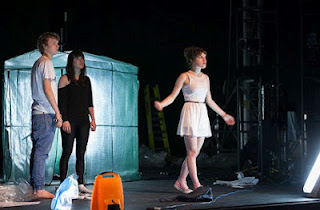'Morning' review or 'A new dawn is rising'
'Morning',
Simon Stephens
Lyric
Theatre, Wednesday 12th
September 2012
Written
for Culture Wars
'Morning'
is a play written in collaboration with teenagers, about
teenagers and dedicated to 'young people'. As with all of Simon
Stephens' plays, it is thought provoking, cheeky, frustrating and –
at certain moments – incredibly scary. It isn't a brilliant play.
It feels a bit to clean and actually a touch too accessible to really
weave those terrific webs that Stephens so often ensnares us in. But
what 'Morning' does offer is the chance for a younger audience to
experience, engage with and enjoy a challenging and genuinely
contemporary brand of theatre. The importance of such a generous and
powerful project should not be under-estimated.
Who
really goes to the fringe, where performers, writers and directors
are still taking risks? Very few teenagers. When I go to the fringe,
I encounter only theatre critics, bona fide theatre obsessives,
friends of the specific theatre and friends of performers. Younger
audience members, still living at home, mainly go to the shows their
parents drag them to. For many, this means a childhood of solid
(invariably dull) Shakespeare productions, glitzy West End revivals,
sparky but generally insubstantial new comedies and razzmatazz
musicals. It isn't exactly a theatrical diet to get the juices
flowing and it's a relief – and a bit of mystery – that
imaginative and innovative young artists still find their way into
the industry. Just imagine if more big stages, such as the Lyric,
committed to putting on shows like 'Morning'; productions that show
teenagers just how weird, unique, playful, suggestive, mind-boggling,
sexy and shit scary theatre can be.
The
first thing that sets 'Morning' apart from most plays geared towards
young people is that it contains sophisticated and ambiguous young
characters. I've lost count of how many token 'children' characters
I've seen on stage. They're often either evil or saintly. But the
cast of 'Morning' is made up entirely of teenagers and each is as
strange and near-impenetrable as the next. Stephanie (Scarlet
Billham) is a unique creation; a child that frightens but does not
appall. A child who commits appalling acts but still remains
sympathetic; who giggles through her pain and whose every laugh rips
right through you. She's a girl turned inside out by the imminent
death of her mother, whose emotions have been bent out of shape by a
context too complex for her young brain to properly process.
It's
brilliant to see younger actors read Stephens' sparse dialogue. Often
the apparent sparseness of Stephens' scripts prompts actors to amp up
the emptiness and you're simply left with nothing. Here, the actors
pour their heart and soul into every line, buoyantly happy with one
word and hideously depressed the next. The result is a dizzying
emotional tornado rather than the arid desert that is created by more
'sophisticated' approaches to Stephens' texts. These young actors
aren't afraid of the emotional contradictions or confusions. They
aren't trying to humour or smooth down the ambiguities latent in
Stephens' dialogue. Instead, they absolutely embrace these
contradictions and the play is so much fresher, truthful and more
lively as a result.
In
allowing his younger actors free reign with his dialogue, Stephens is
creating a younger generation – of both actors and spectators –
who feel comfortable with a new type of theatrical experience; a
theatrical generation that does not look for linearity and reason and
exposition. In short, he's helping to allow our youth to
instinctively embrace something new; the type of odd, clashing and
rather cold dialogue (and surrounding play) that is so common in
Europe and yet so rare over here. The type of disjunctive, cruel and
inconclusive theatre that actually reflects our times. This type of
theatre will, despite the best attempt of many reductive new writing
competitions, eventually reach our shores. When it finally gets here,
at least some of our performers and actors (thanks to the likes of
Simon Stephens and Sean Holmes) will be ready for it.



Comments
Post a Comment